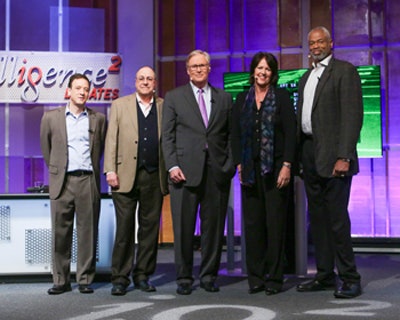Two sides with decidedly different opinions on whether college athletes should be paid participated in a public debate on Tuesday night in New York City.
Whether college athletes should be paid has been a long-running debate in the world of intercollegiate athletics. The conversation has ramped up over the past few years in the wake of court decisions, conference realignments and the increased prominence of a limited number of institutions with powerful athletic programs.
 From left, Andy Schwarz, Joe Nocero, moderator John Donvan, Christine Brennan and Len Elmore. (Photo courtesy of Samuel Lahoz)
From left, Andy Schwarz, Joe Nocero, moderator John Donvan, Christine Brennan and Len Elmore. (Photo courtesy of Samuel Lahoz)On Tuesday night, Intelligence Squared U.S. (IQ2US) staged a debate on the topic, titled “Pay College Athletes.” In favor were Joe Nocera, columnist for Bloomberg View and co-author of Indentured: The Inside Story of the Rebellion Against the NCAA, and Andy Schwarz, economist and partner in OSKR. Against paying college athletes were Christine Brennan, best-selling author and sports columnist for USA Today, and Len Elmore, attorney, television analyst and former NBA player.
Members of the audience were asked to vote on their phones yes, no or undecided before the debate began. Moderated by John Donvan, author and ABC News correspondent, the debate lasted 90 minutes. Each participant presented opening statements, asked questions of each other, took questions from Donvan and audience members and gave closing statements.
IQ2US was created to engage parties in nonpartisan, balanced dialogue on key issues of the day. While often intense in presenting significantly opposing viewpoints, the debate remained respectful throughout.
The fundamental points were clear. The two debaters in favor of paying college athletes said college athletes are being exploited. Colleges, universities, conferences and personnel are making money from the athletes’ labors. The damage is particularly acute for African-American student-athletes, who are graduating at significantly lower rates than African-American non-athletes.
The two opposed to paying college athletes said the athletes are receiving an education, tutoring, high-level training, medical expenses, leadership development and exposure. Pay-for-play could lead to countless Title IX lawsuits and dramatically erode fan support, which in turn can impact everyone at a college or university.
“To economists like me and almost any economist not on the NCAA’s payroll, the NCAA’s enforcement of amateurism is not noble. It’s the classic conduct of an anti-competitive cartel,” said Schwarz, who said college athletes should have the same market access as their coaches.
“Athletes deserve the right to find out … what they’re worth,” he said.Actress Emma Watson was mentioned several times during the debate as it was noted that while she attended Brown University she also made millions of dollars appearing in Harry Potter films. Quarterback Deshaun Watson, who won a national football title while at Clemson, should have had the same opportunities, said the two in favor of pay.
“It’s a benefactor/beneficiary relationship, where the athletes, as beneficiaries, accept the conditions set forth by the benefactors,” countered Elmore. “No one can argue that the NCAA has done it perfectly, but no one can reasonably argue that these benefits don’t have significant value.”
Elmore cited a statistic that graduation rates for African-American student-athletes have risen from 46 percent 15 years ago to a present rate of 77 percent. Nocera disputed that statistic, citing the scandals at University of North Carolina, in which football players were taking fake classes, and at Louisville, which is still unfolding. Allegations include an Adidas executive conspiring to pay a player’s family $100,000 for him to attend the university.
Schwarz said the College Sports Research Institute, based at the University of South Carolina, produces a revised, peer-reviewed version of the NCAA graduation rates that dismantles the NCAA’s statistics.
Brennan said those in favor of paying college athletes referred to basketball and football, but ignored how a shift would impact female athletes.
“How do we pay field hockey?” she asked, saying institutions would face an onslaught of Title IX litigation. Brennan also said pay could lead to drastically increased transferring and less class attendance.
Schwarz and Nocera said there already is disparity among the wealthiest colleges, universities and the rest of the 351 Division I institutions. Paying athletes for their work won’t make it worse. Brennan and Elmore disputed that contention, adding that the education component of higher education will largely disappear for those athletes being paid.
“We live in a market economy,” Schwarz said in his closing statement. “Exploitation is about getting less than you’re worth.”
“We have people likening this to indentured servitude and slavery. That to me is simply for shock value,” Elmore said. He re-emphasized the value of education and pointed to former student-athletes such as football player Dr. Myron Rolle, who is now doing his residency in neurosurgery.
The audience voted again. After the votes were tallied the results were revealed. Prior to the debate 42 percent of the audience was in favor of paying college athletes, 33 percent against and 25 percent undecided. After the debate 60 percent voted in favor of paying, 32 percent against and 18 percent undecided. The team that improved their percentage the most—those in favor of paying—won the debate.



















